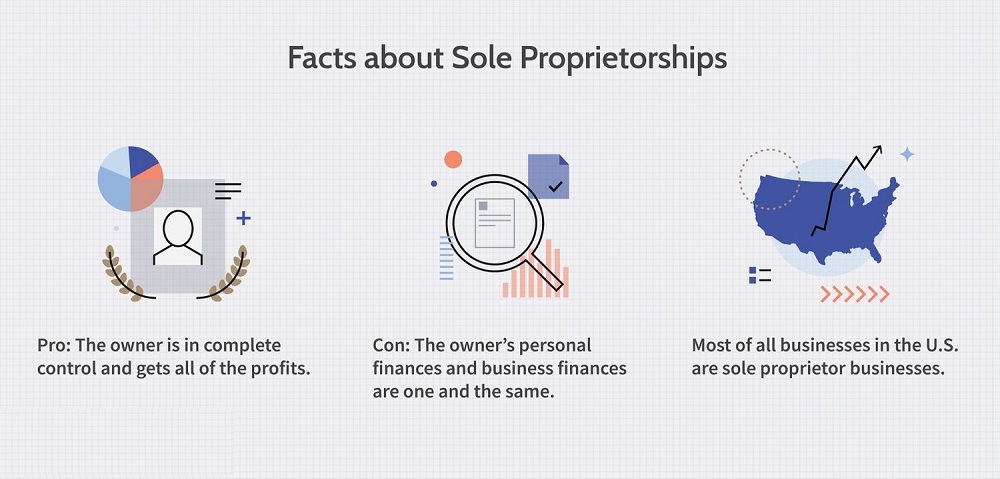Real estate ownership has long been associated with prestige, fortune and credibility; thus, prospective buyers often look for profitable ways to invest in it while driving new trends forward. Attracting younger, independent investors is another advantage to sole ownership assets; when assets are held under just one person’s name, they have complete authority on when and how to sell, use, or pass down ownership to others.
Sole ownership empowers and is tightly interwoven into communities’ grit, security, human capital development, financial freedom and responsibilities. Furthermore, this structure is simple, as no formal steps need to be undertaken for its establishment.
However, sole rights ownership can present numerous drawbacks ranging from tax incentives and liability risks to potential buyers weighing their options before making important investment decisions. Therefore, any prospective buyer must become well-versed in all legal aspects of sole right ownership before making crucial financial decisions.
Table of Contents
ToggleWhat is Sole Ownership?
Sole ownership of real estate assets is one of the simplest forms. As its name suggests, exclusive rights are granted when one owns these real estate assets exclusively. Ownership can easily be transferred, sold on the open market or leased out – making this type of property ideal for land, small retail spaces and multi-family rentals like triplexes and duplexes.
What are some sole ownership Benefits?
Sole ownership brings multiple benefits, from physical control and inheritance to minimal conflicts and credit rating.
Physical Control
Physical control over property owned jointly must be divided between its co-owners; when joint tenants hold title to it, each tenant must seek approval before beginning construction projects, making changes, or selling it.
However, as an independent sole owner, you possess full physical control of any real estate assets owned and can sell, modify, rent, or dispose of them at your discretion.
Inheritance
Once they own property, having sole ownership gives them the flexibility to leave it to whomever they please upon passing away. Even in states with community property laws, assets deemed separate (i.e., those owned solely by one spouse) may be bequeathed by will or trust to whomever the decedent wishes – including charities and non-profit organizations.
Not Restrained by Preemption
Preemption does not apply to immovable property owned solely by one individual; all ownership lies solely with this individual, and no proportional shares are held by anyone else.
Stakeholders in an immovable are not third parties for preemption rights purposes; therefore, other stakeholders do not enjoy them in the event of its sale to one stakeholder.
Minimal Conflicts
As sole ownership requires no partners, its owner does not need to worry about internal differences among them and has unobstructed control of all decisions made quickly and without resistance – the owner bears sole responsibility for any profits or losses sustained from their business venture.
Credit Rating Depends on the Performance
If a person can’t repay the co-owned property loan, the credit rating agency will take notice, and the overall rating will suffer. With poor credit, lenders may reject applications from one partner wanting to start up a small business by applying for a business loan to launch it.
However, a sole proprietorship’s credit rating is tied directly to its sole owner and will not be affected by third-party activities.

What are the Drawbacks of Sole Ownership?
With the benefits of sole ownership, there are also some drawbacks. To keep them out of the line, ensure to be aware of it;
Transferring Property is Complicated
Change of ownership of real estate can be lengthy and time-consuming due to probating requirements for estates owned solely by one party (without wills or trusts in place), as heirs will have to administer any assets left without one after they die, Additionally, after his demise property transfer can require extensive paperwork due to inheritance laws’ stringent rules and regulations about succession rights.
Timely gathering of all necessary paperwork before government officials is often challenging, including collecting a death certificate and documents verifying relationships between heirs and the deceased, such as their ration cards or ID cards.
Limited Asset Protection
Only minimal asset protection can be afforded through such investments; therefore, they could put investors at risk in case of legal suits or financial strain due to not sharing income/expenses among all parties involved.
Unlimited Liability
An independent owner is personally accountable for every debt and can find raising capital difficult as there is no distinction made by law between personal and business assets, further hindering their ability to raise cash.
Owners have daily responsibility for making daily business decisions and are less likely to have access to large sums of capital; as a result, they rely more heavily on overdrafts or savings accounts and face higher borrowing costs and reduced returns due to being self-employed.
Self-Employment Taxes
Owners who operate as sole proprietors face higher tax brackets because business income is considered personal. Any excess between income and expenses must be taxed as self-employment taxes and paid out accordingly.
The Bottom Line!
Asset real estate ownership can help create peace in life; yet one of the more challenging steps when purchasing real estate can be selecting an ownership structure suitable to each asset purchased.
Property owners with sole titles enjoy numerous advantages associated with sole ownership, such as lower start-up costs and maximum control, in addition to its simple structure. Prospective investors should carefully assess both of these points of ownership before investing. However, prospective investors must also weigh its possible disadvantages before considering sole ownership as an option for investment.
